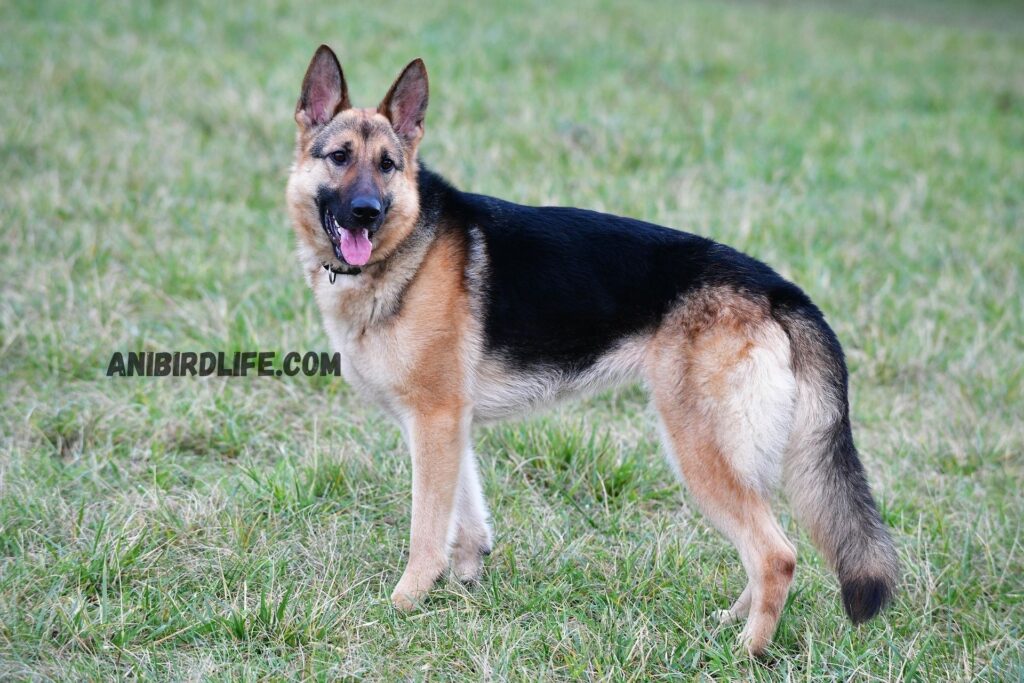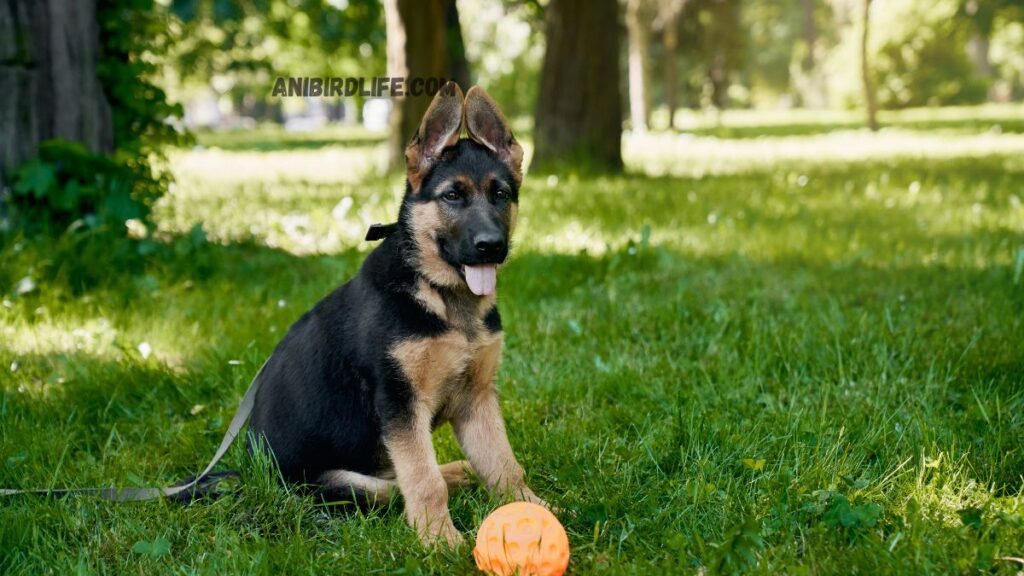German Shepherd puppies are celebrated for their sharp intelligence, strong loyalty, and adaptability. Whether you’re bringing one home as a family pet or for work-related purposes, understanding their temperament, care, and training is crucial for a happy and well-adjusted dog.
German Shepherds were originally bred for herding sheep in Germany, but today they are widely used in police work, search and rescue, and as service animals due to their high intelligence and trainability. These dogs are known for their strong work ethic and deep bond with their owners.
As a first-time owner, it’s crucial to understand and address their specific needs.
They require structured training, ample socialization, and dedicated care. This guide will provide you with everything you need to raise a healthy and well-behaved German Shepherd puppy.

Understanding the Temperament of German Shepherd Puppies
Intelligence and Loyalty
German Shepherds are renowned for their exceptional intelligence among dog breeds.
A well-rounded diet is crucial for supporting their growth and overall development.
They learn commands quickly and are eager to please, making them excellent companions and working dogs.
Their intelligence means they need mental stimulation. If they become bored, they may develop destructive behaviors such as chewing or digging. Puzzle toys, training exercises, and interactive games can help keep their minds engaged.
Protective Nature
German Shepherds have an instinctive drive to protect their family and home.
While this makes them great guard dogs, early socialization is necessary to ensure they don’t become overly aggressive.
They can be wary of strangers, making early exposure to new people and situations crucial. If not properly socialized, they may become overly territorial, which can lead to behavioral problems.
Socialization Needs
Exposing your puppy to different people, environments, and situations early on will help develop a well-mannered and friendly adult dog.
Socialization should start as early as possible. Taking your puppy on walks in different areas, introducing them to other pets, and allowing them to meet various people will help them grow into a confident and well-adjusted dog.

Caring for German Shepherd Puppies
Proper Nutrition and Diet
A well-rounded diet is key to supporting their growth and overall development.
High-quality puppy food rich in protein and healthy fats is recommended.
Because German Shepherds are a large breed, they have specific dietary needs. Look for foods that contain essential nutrients such as omega fatty acids for coat health, calcium for strong bones, and high protein for muscle growth. Be mindful of portion sizes to prevent obesity, as it can contribute to joint issues.
Exercise Requirements
German Shepherd puppies are highly energetic. Consistent play, daily walks, and mental exercises are vital to maintaining their happiness and well-being.
As puppies, they have bursts of energy and require short, frequent play sessions. As they grow, their endurance increases, and they will need longer walks and activities like running or playing fetch. Mental stimulation is just as important as physical exercise to prevent boredom and destructive behaviors.
Grooming and Hygiene
Their thick double coat requires regular brushing to prevent matting and excessive shedding. Bathing should be occasional, ensuring it’s not too frequent to preserve the natural oils in their coat.
Brushing at least twice a week helps reduce shedding and keeps their coat healthy. In shedding season, daily brushing might be required. Regular ear checks and cleaning are important to prevent infections, and nail trims should be done to avoid overgrowth.
Health and Veterinary Care
Routine vet visits, vaccinations, and parasite control are essential to ensure your puppy grows into a strong and healthy adult.
German Shepherds are prone to health concerns like hip dysplasia, bloat, and allergies. Regular vet visits play a key role in early detection and prevention. A balanced diet, consistent exercise, and up-to-date vaccinations are essential for ensuring they live a long, healthy life.

Training German Shepherd Puppies
Importance of Early Training
The earlier you start training, the better. Puppies have a high capacity to learn, and early training sets the foundation for good behavior.
German Shepherds thrive on structure. Establishing routines and boundaries early on helps them understand what is expected of them. Training should be consistent and reward-based to build a positive association with learning.
Basic Commands and Obedience Training
Teaching key commands such as “sit,” “stay,” and “come” is crucial for effective communication.
Using positive reinforcement through treats and praise helps create lasting results.
Start with short training sessions to keep their attention. Gradually introduce more complex commands as they master the basics. German Shepherds respond well to a firm, but gentle training approach.
House Training Tips
Consistency is key. Take your puppy outside frequently and reward them when they eliminate in the right place.
Crate training can be a helpful approach for successfully house training your dog.
Puppies naturally avoid soiling their sleeping area, so using a crate helps reinforce good habits. Stick to a schedule and take them out after meals and naps.
Socialization with Other Pets and People
Encourage positive interactions with other pets and people to prevent fear-based aggression or shyness.
Puppy classes are a great way to expose your dog to different experiences in a controlled environment. Set up playdates with well-mannered dogs and slowly expose them to new surroundings to help with socialization.
Frequent Behavioral Challenges and Effective Ways to Address Them
Separation Anxiety
German Shepherds form strong bonds with their owners. Gradual desensitization to being alone and interactive toys can help ease separation anxiety.
Leave them alone for short periods initially and gradually increase the duration. Providing chew toys or puzzle feeders can keep them occupied while you’re away.
Excessive Barking
If your puppy barks excessively, identify the cause boredom, alertness, or fear and address it with training and enrichment activities.
Teaching the “quiet” command and ensuring they get enough physical and mental stimulation can help reduce unnecessary barking.
Chewing and Destructive Behavior
Providing appropriate chew toys and ensuring enough physical and mental stimulation will reduce unwanted chewing.
Redirecting their attention to a chew toy when they start biting inappropriate objects can reinforce good behavior.
Conclusion
German Shepherd puppies require dedicated care, training, and socialization to grow into well-behaved and loving companions. With patience and consistency, they make one of the best canine partners you could ever have.
FAQs
1. How long does it take to train a German Shepherd puppy?
Training a German Shepherd puppy is an ongoing process, but basic obedience training usually takes about 4–6 months. More advanced training, including socialization and behavioral refinement, can take up to a year or longer. Consistency and positive reinforcement are key.
2. Are German Shepherd puppies good with children?
Yes, German Shepherd puppies can be great with children if properly socialized from an early age. They are protective, loyal, and intelligent, making them excellent family dogs. However, supervision is recommended, especially with young children, to ensure safe interactions.
3. How often should I feed my German Shepherd puppy?
Puppies should be fed 3–4 small meals a day until they are about six months old. Once they’re ready, you can switch to feeding them two meals a day.
Always provide high-quality dog food appropriate for their age and breed size.
4. When should I start socializing my German Shepherd puppy?
Socialization should start as early as 7–8 weeks old. Exposing them to new people, pets, and environments during this early stage helps prevent fearfulness and aggression later in life. Enrolling in puppy training classes can be a great way to boost their learning and socialization.
5. How can I prevent my German Shepherd puppy from biting?
Puppy biting is normal but should be managed early. Redirect their biting to appropriate chew toys, use firm but gentle corrections, and reinforce positive behaviors with treats and praise. Teaching the “leave it” and “no bite” commands can also help.
